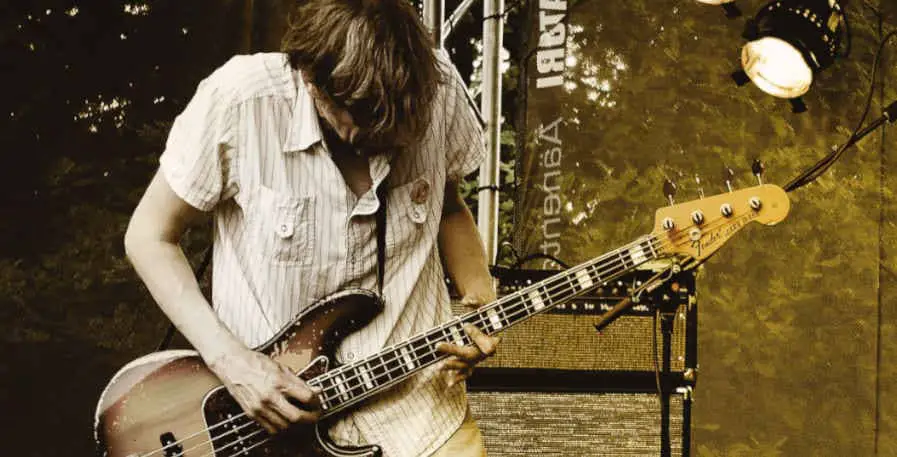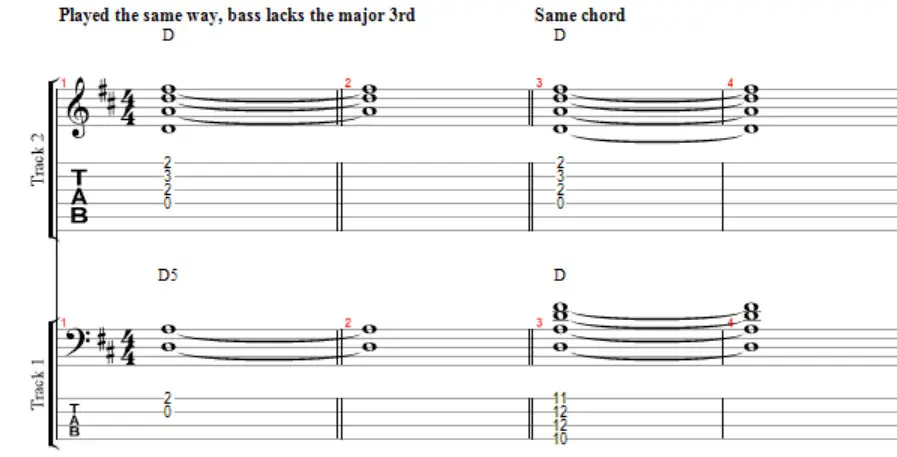Playing chords on the bass guitar is somewhat of an enigma. There is nothing stopping them, but few bassists seem to use chords the same way guitarists do. So why is that?
Through trial and error, I`ve incorporated some chords into my basslines through the years. At first, this did more harm than good. However, failing at it was a valuable experience that made me understand how I should use and think about chords as a bassist.
Therefore, I have written this article so that you won’t have to make the same mistakes I did. Hopefully, this will also help speed up your overall progress as a bass player.
I will show you why strumming the bass is uncommon, but how some bassists make it work. You will also learn the difference between using chords and strumming them and how guitar chords differ from bass chords.
Do bass players play chords?
While chords can be played on the bass guitar, only a handful of bassists strum chords like a guitarist would. Some bassists like Les Claypool and Chris Squire strum chords intermittently to create grooves. Other bassists like Lemmy and Mark Hoppus have strummed chords to add power and drive to their sound.
So while they are uncommon, bassists can strum chords. Generally, it takes great knowledge of the bass to do this well. Furthermore, it can sound incredibly intrusive to the overall sound of a band when bass chords are utilized poorly.
Bass chords are also rarely necessary. The job of the bassist is to fill in the low end and provide groove in a band. Not only can bassists do this without playing chords, but strumming chords often make it harder to do this job well.
For this reason, most bassists prefer to not strum chords at all. The bassists that do strum chords generally do so on rare occasions. When they do strum chords they often stick to power chords, as these types of chords are less prone to sound muddy or harmonically intrusive.
Some bassists, like Peter Hook of Joy Division and Jesse F. Keeler of Death From Above 1979, have strummed chords high up on the neck of the bass. This is a great option for getting a clearer sound and allows for more harmony in their playing.
The drawback of doing this is that it leads to a colossal lack of low-end. This generally leads to songs sounding hollow; a common issue for bands without bassists. Thus, they reserve this type of playing to select parts of songs where it sounds fitting.

Do bass players need to learn chords?
An intermediate bassist will have knowledge of chords and know how to play them. While few bassists strum chords, having knowledge of them is paramount for knowing what notes to use for creating grooves and harmonies.
A common misconception about chords is that knowing them means you have to strum them. A guitarist might strum a chord, or she might instead play the chord notes individually or even sweep pick them. The same goes for bassists, only they rarely elect to strum.
Great bassists will know what chords are making up the songs that they are playing. This allows them to create grooves that have a great harmonic foundation behind them. They might just play one note at a time, but they will incorporate several if not all of the notes that make up a chord into their basslines.
Therefore, an intermediate bassist will know what notes make up common chords. They will also know where to find them at different positions on their fretboard.
This is not to say that an intermediate bassist will be proficient at strumming chords or switching between them. Some will be, but this is a niche skill that some bassists choose to develop while most don`t.
Can you use guitar chords on the bass?
Because the standard tuning for both basses and guitars is E, the same chords can be played on both instruments. Chords on the bass will however be an octave lower, and some chords might need to be voiced differently in order to incorporate every chord tone.
If you try to play a guitar chord on the bass it will still sound harmonic. However, due to the bass being tuned an octave lower than the guitar, bass chords tend to sound muddy.
Furthermore, the guitar often relies on the high B and E strings to make up essential chord tones. If you try to play the chord the same way on a bass guitar, you will lack the strings to make up the entire chord.
Related reading: 7 easy beginner bass chords
A good example of this is a common voicing for the D major chord on the guitar. Notice how the bass cannot play it the same way, but the chord can be adapted to be played further up on the neck of the bass:

The bass can only play 2 of the 4 notes due to not having a high B or E string. Thus, the D chord ends up lacking the major 3rd and instead becomes a D5 chord.
However, as you can see above, the chord can instead be played higher up on the fretboard to include these notes.
The D major chord is a fairly simple example of this, but the same method can be applied to any chord that has 4 or fewer different notes in it. Therefore, you can play the vast majority of guitar chords on the bass as well.
This is because both the bass and guitar are tuned to E standard. The same principle can not be applied to bass and ukulele chords, or any other instrument that uses a different tuning.
Conclusion
So, do bass players play chords? Yes. Bass chords can sound amazing when they are strummed at the right times. Bassists that make good use of strumming chords are able to stand out and elevate their music in a way that would otherwise be impossible.
However, it takes great skill and knowledge to strum chords in a way that makes sense and doesn`t ruin the overall sound of a band. It`s also possible to be a professional and unique bassist without ever having strummed a chord. Therefore, most bassists simply choose to not strum their instruments.
Instead, bassists develop an understanding of the chords that they use to create grooves. They are still playing chords, but they are not strumming them.
Being knowledgeable of how guitar chords and bass chords relate to one another is helpful for both guitarists and bassists. Understanding how a guitar chord is voiced and what chord progression is being played will help a knowledgeable bassist write grooves that fit well with the guitar part, as well as the rest of the band.
Knowledge of bass chords is just one of the reasons why playing bass will make you a better guitar player. To learn more about how the bass will make you better at the 6-string, read my 5 reasons why learning bass will make you a better guitarist.

